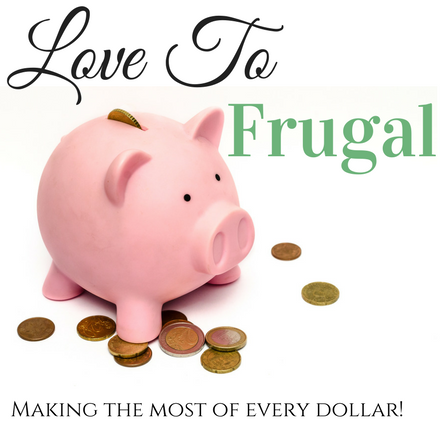Easy Ways To Improve Your Finances
No matter where you are in your financial journey, there’s ALWAYS something that you can do to improve your finances. You may think that it will take months, if not years, to accomplish this. Saving for retirement, saving for a down payment for a home or a car. It can seem overwhelming when you you have big goals, but while these are pretty lofty tasks to accomplish, there are so many other ways to improve your finances that only take a little bit of effort and can yield huge results.
*This post may contain affiliate links. For more information, see my disclosure page.
19 Easy Ways To Improve Your Finances
Whether you do some or all of the suggestions below, each one is a step to improving and making your financial goals a reality. This is a long post, so let’s get started!
Start With A Budget!
All of my post seem to start with “you need a budget”, but without one, your finances will never improve. It’s like your trying to get somewhere by running in place. It just won’t happen.
If you’ve been avoiding doing a budget because you think a budget is restrictive, I’m going to tell you that’s the furthest thing from the truth. A budget is freedom and what you will most likely find from doing a budget is that you’re going to feel like you got a big, fat raise!
I’ll never forget the first time I did a budget. We had so many leaks in our finances. What I mean by that is we were making too much money to be as broke as we were. But the problem was we had no idea where the money was going.
In the beginning…
When you first start budgeting, it’s not only a good idea but absolutely necessary to track your spending. This will give you a more clear picture of where your money is actually going. A great place to start would be to begin writing everything that you spend, down. After a month, you will begin to see a clear picture. Your bank statements are another excellent resource for finding out where your money went.
When I put everything down on paper, I found money that we didn’t know we had and where the leaks were in our budget. You’ll be amazed that when you begin to give every dollar a name, you’ll most likely have more money to work with.
If you need help with doing a budget, check out my post on 8 steps to starting a budget. It’s not as hard as you may think. It will, however, take you 2-3 months to get it just right. Please don’t get discouraged if it doesn’t work, at first. It will get easier.
Save An Emergency Fund…asap!
An emergency fund is at the top of the list for improving your finances and you need one ASAP…like yesterday! You may ask why would I do this before I get out of debt. Well…an emergency fund is going to help keep you from going into deeper debt!
It never fails, that when you can least afford it, old Murphy will move into your spare bedroom.
An emergency fund of about $1,000 would be just enough when life’s little crisis’ happens. It’s not a matter of if it happens…it’s when.
It could be a minor medical emergency, your car battery dies, your pet needs her stomach pumped from getting into a bag of Hershey kisses (yep…It happened) or any other small emergencies that happen in life.
If you already have the money set aside, there will be no need to whip out the MasterCard or Visa.
So, please don’t put this off. Have a huge garage sale, sell stuff on Craigslist, deliver pizzas for a month or two or whatever it takes to get that account funded. You’ll sleep so much better at night knowing that you’re at least some prepared for life’s little emergencies.
Create A Debt Reduction Plan
Having a plan is a huge step when it comes to improving your finances. Once you have a budget in place, you’ll be able to see a clear picture of the state of your finances.
When you know where you stand with your income, your debt and your savings, you can then devise a plan for getting out of debt. I strongly recommend using the Debt Snowball Method for this. This is the method that we used when we were digging out of debt and let me tell you…IT WORKS! It’s a simple plan that gives you small wins along the way and keeps you very motivated to keep pressing forward. If you would like to know more, check out my post on How To Get Out Of Debt With The Debt Snowball.
Check Your Credit Report
Since you are creating your debt reduction plan, it’s a very good idea to check your credit report to make sure that it’s accurate. There may be something that you’ve forgotten about, like an old debt, or there very well could be some mistakes on it.
Identity theft has become a growing problem and if there is something amiss, the sooner you detect it, the better.
You can get an annual free credit report at www.annualcreditreport.com. This is available at no cost to you and no strings attached. I strongly recommend checking it out, especially if your looking to improve your finances.
Credit Karma is another excellent credit monitoring site, which I personally use. It’s easy to sign up and it’s FREE!
Make (at least) Minimum Payments Every Month
Now, I don’t mean to do just this to get out of debt. That’s not what the Debt Snowball recommends.
What I’m saying is, if you’re trying to improve your finances, you CAN NOT miss payments. If all you can pay, for the time being, is the minimum on your debts, then by all means…pay only the minimum until you can get your head above water.
If your situation is more dire, then you would take care of the four walls, first and foremost. The four walls are food, utilities, rent/mortage, transportation. But, we’re talking about improving finances, here. Not just trying to survive.
Increase Your Income
Increasing your income can only help to improve your finances. You can use it to reduce debt, increase your savings, add to your retirement and so much more! Get a part time job, ask for a raise, open an Etsy store, babysit, dog walk or whatever it takes to increase your monthly cash flow.
Save SOMETHING Every Month
Once you’ve saved your basic emergency fund and gotten your debt under control, it’s time to start beefing up a larger emergency fund. Dave Ramsey recommends saving 3-6 months worth of expenses. This would come in handy in case of a job loss. In today’s world, we all know that there’s no such thing as job security.
A 3-6 month emergency fund would allow you some breathing room and time to hunt for a decent job or figure out how to replace the lost income.
I know that saving, when you’re trying to get out of debt is hard, but start looking at expenses, in your budget, that you could maybe cut.
Even if you can only save $40 or $50 a month, that’s better than nothing.
One way to make saving a habit, is to automate it. Most banks are happy to do this for you. Take it right off the top of your paycheck and have it deposited into a separate account.
I have found that when you do it this way, you most probably, will never miss it.
Know Your Net Worth
Knowing your net worth is key when you’re wanting to improve your finances.
Your net worth is the total value of your assets minus the total value of your liabilities. This won’t help you when you’re making day to day decisions regarding your budget, but it’s very useful in letting you know where you stand, financially.
If you’re not sure what your assets and liabilities are, here are some guidelines:
Assets: Assets include cash (checking, savings and retirement accounts) and items such as property, vehicles and any investments that can be sold for cash. You can include your home in this category if you would be willing to sell it, should the need arise. But realistically, the equity you have in it is the asset. (Equity is what is would sell for minus what you owe.)
Liabilities: Liabilities are debt. This includes credit cards, auto loans, personal loans, or any other type of loans that you may owe. If you have a mortgage, what you owe on it will be counted as a liability, as well.
You can can calculate your net worth, using this Net Worth Calculator.
Review Your W-4
If you work for an employer that automatically withholds taxes from your paycheck, then you probably filled out a W-4 when you first started that job. You had to “claim” a certain number for allowances.
The total number of allowances you claim determines how much tax is withheld from your paycheck. The more allowances you claim, the less tax that is withheld.
You may or may not have paid much attention to this when you were first hired, but over time, it’s a good idea to review this number, especially if you’ve had any changes in your life like having a child, getting married (or divorced), having an older child that is no longer a dependent, buying or selling a home or any other life changing situations.
If you are getting a large refund, every year, you may be delighted come tax time, but this signals that you’re having too much taken out, during the year. What you are doing is giving Uncle Sam a tax free loan on your money! That’s money that could be used to pay bills, feed your family, get out of debt, or add to your savings account during the year. Don’t do this!
If you are paying in every year, that means your not having enough taken out, obviously. The ideal situation for taxes is to break even. Don’t pay too much, but make sure you’re paying enough. Usually, claiming the actual allowances that you have, will work, but when in doubt, consult with a professional tax preparer.
Know Your Employer Benefits
If you or your spouse are working for a company that provides benefits to their employees, it really pays to take the time to make sure you’re getting the most out of the benefits that they offer.
Some of these benefits may include retirement (401Ks- Does the employer offer a match?), health insurance, dental/vision insurance and flexible spending accounts.
Not all of these benefits may be worth the additional money that you pay for them, but some of them may be. Before you randomly sign up for anything, do a little homework and ask questions. Usually, there will be a person in Human Resources that can explain benefits to you.
Open A Roth IRA
I can’t say enough good things about the Roth IRA. The Roth IRA is great because it allows you to contribute after tax dollars and allows those contributions to grow tax free. What that means is when you withdraw the money in retirement you won’t have to pay any taxes on that money. If you think your tax rate will be higher in retirement, this is a very smart move. Also, with a Roth, you can withdraw your contributions whenever you need them without penalty. It can also be used for college and home purchase withdrawals.
If you’d like to know more about a Roth, spend some time researching and see if it will work for you at this point in your financial life. Typically, it doesn’t cost anything to open a Roth IRA, so it may be wise to go ahead and open an account and start automatically contributing a small amount each month.
Learn more about IRA’s, here: Differences Between Roth and Traditional IRAs
Review Your Car Insurance
Not many people do an annual review on their car insurance, but by doing this, you can really save a substantial amount of money. Insurance rates are extremely variable as are financial situations. Our lives change on a regular basis and what applied to you last year could be totally different this year.
Here are some great tips for saving money on auto insurance, that you may not have thought of.
Refinance Your Mortgage/Debt
If you have a mortgage and plan on staying in the home for at least 5 more years (and haven’t refinanced in at least two years), get a refinance quote and see if you can reduce your rate.
If you can drop your interest rate at least 2 points, it may be very well worth it. I, like Dave Ramsey, recommend doing a 15 year mortgage, as opposed to a 30, for so many reasons. The amount of money you will save is mind blowing! Make sure that the mortgage is no more than 1/4 of your take home pay, as well.
If you have credit card debt, call your credit card company and ask for a rate reduction. All they can say is “no”. It’s possible that you might also be able to qualify for a 0% – low interest card, but be mindful of the transfer balance charges. Usually, it’s about 3% of the transfer amount. In some cases, it may not be worth it. You may just have to get intense about paying off the existing card…Then CUT IT UP!!
Do A Spending Break
A spending break can help you, tremendously, when you’re trying to get on top of your finances. It’s exactly what is says it is…A break from spending.
You need to decide how long you think you can go without spending anything. Can you do 2, 3 or 4 weeks? This doesn’t mean to not pay your bills. This means you are going to try and stop unnecessary spending. If Target is your weakness, stay away from Target. If you make a habit of hitting up Starbucks, try making your own coffee at home. When you go grocery shopping, do you end up spending way more than you need to? If so, then plan your meals, go with a list and use cash. That way, you’ll be sure to stay within your grocery budget.
You get the idea. A spending break may be just what your finances need to try and get a little ahead of the month. This will also help you to live at or below your means.
Try to make it fun and a challenge! I did a spending break from buying any clothes a few months ago and went for 4 1/2 months without buying one single clothing or accessory item (The thrift store is my weakness)…and you know what? I made it just fine! You can do it, too!!
You may be interested in: How To Improve Your Finances With A No Spend Month Challenge
Make A Will
No one enjoys talking about death, but I’m sure you already know…it’s inevitable. None of us will make it out alive. Sadly, so many of us die intestate. That means dying without a will. You can save your family a lot of pain and heartache by taking care of this sooner, rather than later.
A will is especially important if you have minor children. It’s going to designates who will get your children in the event of you and your spouse’s death. A will is also important because it dictates how your assets will be divided up among your heirs when you pass away.
If you have significant wealth, I strongly urge you to go to a lawyer, but if your estate is fairly simple, there are easy ways to do it. We used Legal Zoom and purchased a basic will for $69.
Here is also a link for a basic Family Law Legal Planning Kit from Amazon. It contains everything you need including 2 Last Will & Testaments, Durable Power of Attorneys and Healthcare directives.
If you would like to write out your own will, heres a list of guidelines, for you to follow. Any of these options are perfectly legal and should include notarizing.
Get/Review Your Life Insurance
Here’s another topic (besides getting a will) that so many people try to avoid. I actually heard someone say once, that they were afraid if they got life insurance, they would die, soon!! What?????? Please don’t believe this!
If your loved ones depend on your financial support for their livelihood, then life insurance is a must, because it replaces your income when you die. This is especially important for parents of young children or adults who would find it difficult to sustain their standard of living if they no longer had access to the income provide by their partner. You will also need to provide enough money to cover the costs of hiring someone to cover the day-to-day household tasks, like cleaning, laundry, cooking, childcare and everything else a growing family needs.
There are two kinds of life insurance that you need to know about. There’s Term and Whole Life. My personal opinion is go with Term…hands down! When you buy Term, that’s all you’re paying for. Insurance..
Whole life is a horrible product and no one, except insurance agents, recommend it. They tout it as a savings account, but the rate of return is horrendous AND it’s super expensive! Do your “savings” elsewhere…not in an insurance policy.
Communicate With Your Partner
If you have a significant other, communication is key if you want to succeed. Working together and being on the same financial page will help to accelerate the process.
I recommend actually having a “budget” meeting at least once a month to discuss financial goals, purchases and/or anything to do with the budget. These meetings don’t have to take very long. They can be 15 minutes to an hour, depending on how much there is to discuss, but the important thing is, make sure you have them. There can still be one person that pays the bills but there needs to be input from both sides. You may not agree on everything, either, and that’s ok! Use these meetings as an opportunity to try and work these differences out.
If you are single, ask a trusted friend or relative to be your accountability partner. Everyone needs a support system when it comes to finances. If you’re not comfortable with someone close to you knowing about your finances, there are financial advisors that can help to steer you in the right direction.
Bottom line is that you don’t have to do it alone.
Listen To Dave Ramsey
Over the last 20 years, or so, I have continually listened to Dave’s radio show and have learned an enormous amount of information on personal finance. By listening to him on a regular basis, it has been fairly easy to keep my motivation on this journey to financial peace.
I have to admit, that even though I’ve learned so much from him, I still don’t know everything there is to know about personal finance. There’s ALWAYS something new and unique to learn and I actually look forward to hearing what each caller will ask. Listening to him often has also kept me extremely motivated, especially when I felt like throwing in the towel.
You don’t have to tune in at the same time, everyday, to hear his show. I usually listen to Dave in the morning, while I’m getting ready. He has his own channel on IHeart radio. There’s also his podcast and YouTube. You can find him pretty much everywhere. You can also Google his radio show for times and local channels so the next time your in your car, you can tune in.
Another awesome resource for help is his book, The Total Money Makeover. I think anyone that is wanting to get out of debt and improve their finances should read this book. It can be life changing!
Be Generous…
You may be wondering how the simple act of giving (generosity) can improve your finances.
While you don’t want to give away money that you can’t afford to part with, there is no reason why everyone can’t give something no matter how large or small. Giving can be done by tithing to your church, your favorite (reputable) charity, your time (volunteering) or so many other ways.
The old saying “It’s better to give than receive” may hold true, but when you give, you really do receive. Giving to others takes the focus off of oneself and our own problems. In other words…Giving improves your mood and mindset and it lowers stress levels. John Kennedy once said, “The rising tide lifts all boats.”
The simple act of generosity can help you improve your finances, boost your quality of life, and open your eyes to so many other opportunities.
Finally…
When you’re looking for ways to improve your finances, this is quite a list, but when you implement all or even some of these suggestions, you can’t help but see an improvement, not only in your finance, but also life in general.
What are some steps that you have taken to improve your finances? Leave me a comment below and be sure to subscribe to Love To Frugal for more frugal living and money saving tips!




All great tips. We also do a Pantry Challenge once or twice a year -like a spending break but specifically for groceries.
Thank you, Sarita! A pantry challenge is a great place to start and save lots of money! It also encourages creativity with meals.
Great steps to start to get your finances in order. even if I do a couple of these steps it will definitely help. Thanks for sharing.
Thanks so much, Kathy! Every little bit helps!